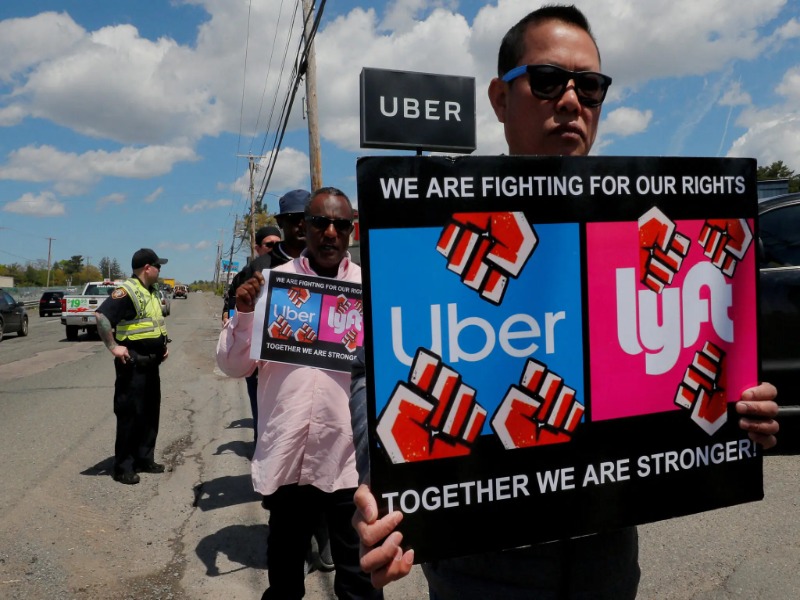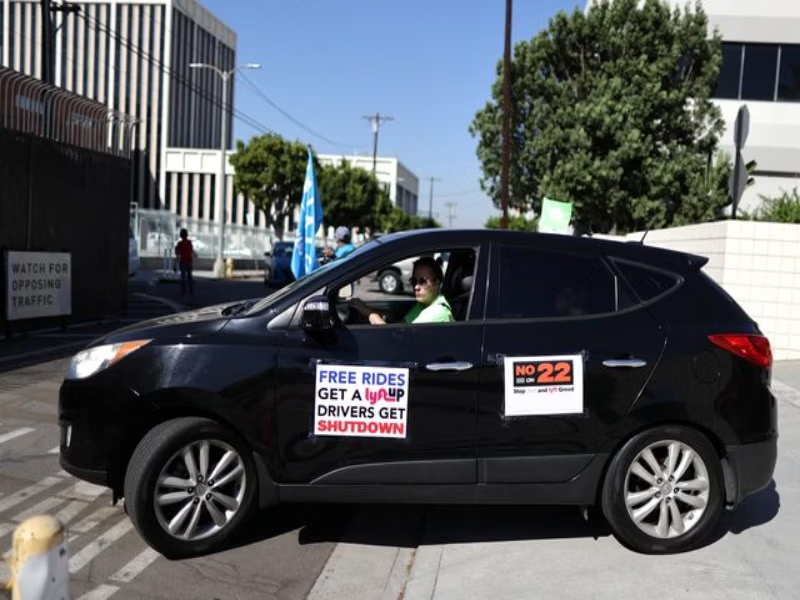Over 800,000 ride-hailing firm drivers in California will soon have a chance to become union members and collectively bargain over wages and benefits under a measure signed Friday by Governor Gavin Newsom.
Proponents claimed that the new legislation will create an avenue to the greatest increase in private sector collective bargaining rights in state history. The law represents a major concession to the decades-long conflict between unions and tech firms.
The second state in which Uber and Lyft drivers will be able to unionize as independent contractors is California.
Massachusetts voters voted in November by a ballot referendum permitting unionization, and drivers in Illinois and Minnesota are seeking comparable privileges.
Newsom declared the signing of the agreement at an unrelated news conference at the University of California, Berkeley. He said that the new laws will grant drivers “dignity and a say about their future.”
The agreement between Newsom, state lawmakers, and the Service Employees International Union, as well as rideshare companies Uber and Lyft, includes the new law as part of it.
Newsom, in turn, signed a bill backed by Uber and Lyft to drastically reduce the insurance liability of the companies in cases of accidents involving underinsured drivers.
Lyft CEO David Risher reported that the new insurance rates will save the company $200 million and may enable the company to drop fares in September.
The cost of an Uber or Lyft ride in California is always more than it would be in other regions of the US due to insurance regulations, the two companies claim.
Uber has indicated that around one-third of all ride fees in the state are spent on covering state insurance requirements.
Technology firms and trade unions have battled over the rights of drivers. The California Supreme Court decided that mobile app-based ride-hailing and delivery services, such as Uber and Lyft, could continue to treat their drivers as independent contractors who did not have any rights, including overtime and paid sick leave, and unemployment insurance, last year in July.
A new law implemented in 2019 allowed Uber and Lyft to offer drivers benefits, but voters overturned it on the ballot in 2020.

The new collective bargaining provision enables rideshare drivers in California to become union members even though they are considered independent contractors and obligates gig firms to bargain in good faith.
Therefore, the new legislation does not cover drivers of delivery apps such as DoorDash.
The insurance provision will lower the coverage limit on accidental incidents incurred by under-insured or uninsured drivers to $1 million to $60,000 per person and $300,000 USD per accident.
In a statement, Head of Public Policy for California of Uber, Ramona Prieto said, the two measures “together represent a compromise that lowers costs for riders while creating stronger voices for drivers — demonstrating how industry, labor, and lawmakers can work together to deliver real solutions.”
A Los Angeles-based advocacy organization known as Rideshare Drivers United, which represents 20,000 drivers, had claimed that the collective bargaining law is weak enough to provide drivers with a fair contract. The group desired to make the companies disclose their data on pay to the state.
The group stated that the way of New York City drivers also rose when the city began forcing the companies to disclose the amount an average driver makes.
President of Rideshare Drivers United, Nicole Moore, adds, “Drivers really need the backing of the state to ensure that not only is a wage proposal actually going to help drivers, but that there is progress in drivers’ pay over the years.”
Other drivers reported that the legislation will offer additional job safety and benefits.
A significant portion of those who are pro-unionization reported experiencing a list of problems, such as being “deactivated” out of their apps without explanation or an adequate appeal procedure when a passenger complains.
A gig driver of Los Angeles, Ana Barragan, added in her statement that “Drivers have had no way to fight back against the gig companies taking more and more of the passenger fare, or to challenge unfair deactivations that cost us our livelihoods. We’ve worked long hours, faced disrespect, and had no voice, just silence on the other end of the app. But now, with the right to organize a strong, democratic union, I feel hope.”






